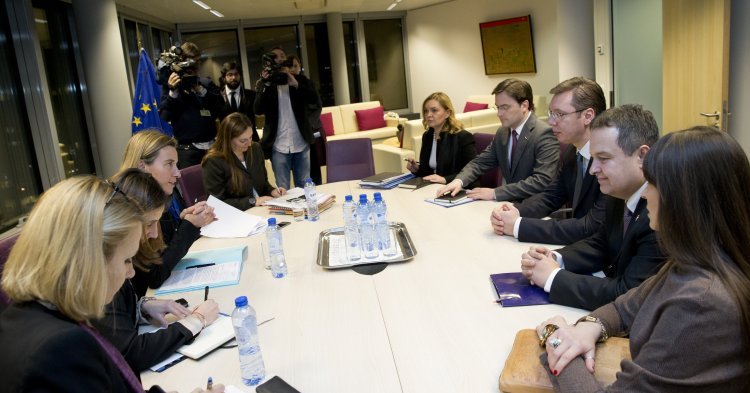Missing the 2000s fast train to Brussels
New countries of the former Yugoslavia have had a traumatic beginning as a result of the breakup through bloody wars. Albania, not having long democratic traditions, has moved two steps forward and one backward. When the unstable times in the Balkans ended, there was a unanimous accordance as regarding the way these countries should follow to build their own democracy: joining the EU was thought to be the right direction. This target has been the main impetus for important advancements towards the democracy consolidation, rule of law and free market. In this context, some countries from the Balkans region such as Romania, Bulgaria, Slovenia and Croatia have joined the EU. However, the EU seems to have lost its previous brightness and influence as a result of various factors such as the financial crisis of 2008, the Brexit referendum, the emergence of populism and threats of terrorism. Western Balkan countries, which were not able to reach the 2000s train of optimism to Brussels, seem to have been falling behind integrity process. As a result, Commissioner Johannes Hahn declared in Autumn 2014 that no country would join the EU in the next 5 years, confirming Jean-Claude Juncker’s stence on enlargement. (1) This overall atmosphere of euro-skepticism, insecurity and withdrawal from the EU project has favored a prolific layer to the revival of old illnesses in the Western Balkans such as authoritarianism, nationalism and oligarchy.
Democracy in current regress in the Western Balkans
According to the last report of Freedom House, Western Balkans are facing regression in terms of democracy scores. (2) Albania, being the most pro-European country of the region, has stopped its steps towards European integration as a result of the corrupted governance and the inclusion of crime into politics. The prolonged transition and the lack of a quick adherence to EU are the main causes of the Albanian fatigue. Macedonia has been facing a period of political turbulence over the past year and it is not capable of overcoming it even after the last elections. Political crisis in Skopje may turn into an inter-ethnic crisis, as the corrupted elite uses nationalism to manipulate the crowd forto their own interest. The project of integration has lost its way due to the resistance of the old-fashioned politicians that are afraid of the punishment from an independent judiciary system. Kosovo the newest country in the region is facing various challenges in consolidating the democracy and the state in the international arena. Moreover, it is after a prolonged political crisis and an aggravation of the relationships with Serbia. Dragging out the process of visa liberalization and the integration in EU may weaken the pro-European approach of Pristina. Montenegro suffered a political tumult last year that almost took the country out of control. Russia was accused of organizing a coup d’etat which caused the collapse of the government. Serbia just elected its Prime Minister Alexander Vucic as President and is now dominating the political stage. (3)He is accused of manipulating the media and his strong connections with Russia are still present. On the other side, he tries to push Serbia towards EU. The normalization of relations with Kosovo remains the challenge of Beograd, whereas business connections with politics are affecting democracy’s principles. Bosnia-Herzegovina is being trapped by inter-ethnic crisis. The Dayton Agreement system is not functioning properly and the country has made no progress regarding democracy.
A more energetic approach of the EU is essential
This situation indicates that the Western Balkan countries are in a process of stepping back from liberal democracy. The EU has removed its attention from these countries since it is facing domestic challenges. The outcome is a regional power vacuum which along with the lack of perspective is depreciating the European Union in the eyes of the citizens and empowering authoritarian tendencies. Apart from its exchange with nationalism and authoritarianism, democracy is also being exchanged with a new form of power structure: oligarchy, a government in which a small group exercises control especially for corrupt and selfish purposes. A new appealing mechanism is needed to lead these countries towards a rapid integration in the EU. The Berlin process that have started in 2014 was a great initiative but it dimmed as a result of the inner EU security challenges and the rise of populism in Europe. A good model might be a Marshall Plan that would accelerate economic modernization, check thoroughly the execution of democratic principles, and furthermore it would avoid the Russian influence and democracy shift. As Samuel P.Huntigton said in Democracy’s third wave : “Among the factors contributing to transitions away from democracy is the weakness of democratic values among key elite groups and the general public”. Therefore, it is the right moment for the EU to show its leadership in the region and not to allow a regression of democracy.
(1) http://www.euractiv.com/section/enlargement/video/hahn-no-partner-will-join-the-eu-in-the-next-5-years/ (2) https://freedomhouse.org/report/nations-transit/nations-transit-2017 (3) http://www.balkaninsight.com/en/article/nyt-warns-against-vucic-autocracy-in-serbia-04-10-201

Follow the comments: |
|
